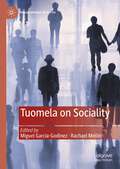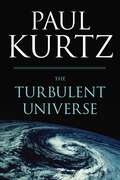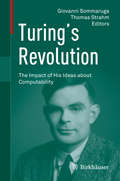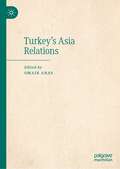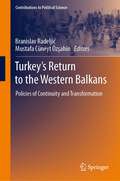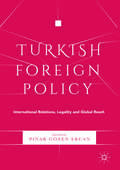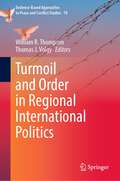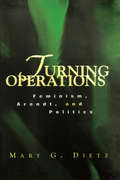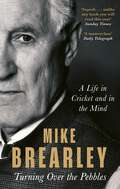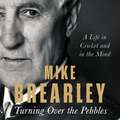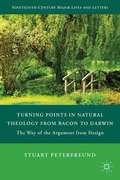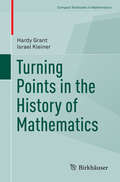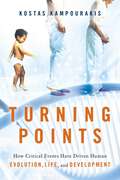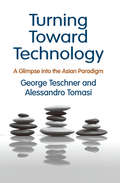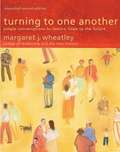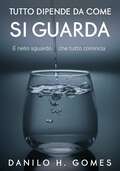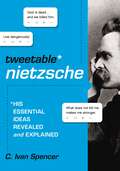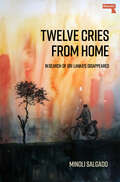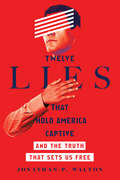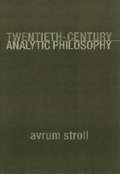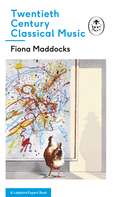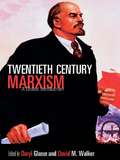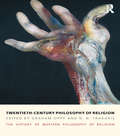- Table View
- List View
Tuomela on Sociality (Philosophers in Depth)
by Miguel Garcia-Godinez Rachael MellinRaimo Tuomela, late Professor Emeritus at the Centre for Philosophy of Social Sciences (TINT), University of Helsinki, is widely regarded as one of the most important philosophers of our time. He published extensively on various topics within social philosophy; particularly, on social action, cooperation, group belief, group responsibility, group reasoning, social practices, and institutions. To celebrate his legacy, this volume engages with and delves deeply into his philosophy of sociality. By gathering original essays from a world-class line-up of social ontologists, social action theorists, and social philosophers, this collection provides the first comprehensive and critical treatment of Tuomela's outstanding contribution to social ontology and collective intentionality.
Turbulent Universe
by Paul KurtzIn his final book, the late Paul Kurtz outlines his personal vision for a planetary ethics inspired by scientific wisdom. Blending realism and optimism, he lays out the basic principles of an ethical approach that he calls humanist eupraxsophy—that is, the application of practical moral choices inspired by scientific wisdom. Emphasizing the dramatic character of the biosphere, human affairs, and the physical universe itself, Kurtz has structured the book in terms of an operatic scenario, with an overture, intermezzo, nine acts, and a grand finale. Citing the emergence of a new planetary civilization, he proposes the development of a planetary ethics based on universal human rights, free scientific inquiry unfettered by dogma, an attitude of exuberance toward human potentials, and courage and determination in the face of the daunting challenges of our time. Kurtz concludes on an enthusiastic note: there is meaning to be found in creative human endeavors as well as a sense of awe and profound reverence inspired by the spectacle of the enormous universe and the prospects for the human adventure.
Turing’s Revolution: The Impact of His Ideas about Computability
by Giovanni Sommaruga Thomas StrahmThis book provides an overview of the confluence of ideas in Turing’s era and work and examines the impact of his work on mathematical logic and theoretical computer science. It combines contributions by well-known scientists on the history and philosophy of computability theory as well as on generalised Turing computability. By looking at the roots and at the philosophical and technical influence of Turing’s work, it is possible to gather new perspectives and new research topics which might be considered as a continuation of Turing’s working ideas well into the 21st century.The Stored-Program Universal Computer: Did Zuse Anticipate Turing and von Neumann?” is available open access under a Creative Commons Attribution 4.0 International License via link.springer.com
Turkey's Asia Relations
by Omair AnasThis book explores shifts in Turkey's foreign policy and the relevance of Turkey's reconnect offensive with Asia. With the end of the Cold War, Turkey and the West had lost the mutuality of interests and threat perceptions, particularly towards Russia. Western countries are now occupied by the rise of China and are in search of new allies in the Asia Pacific. Turkey is left in its region to deal with Russia and crises that are primary outcomes of Western failures in Syria, Libya, Iraq, Azerbaijan, and Qatar. In the absence of its Western allies, Turkey engaged with Russia alone to deconflict and stabilise Syria, Libya, and Azerbaijan. Turkey's ruling conservative AK Party, however, had won elections from 2002 to 2012 on a strong pro-EU and pro-West agenda. Now, it is talking about ‘strategic autonomy’, ‘multidimensionalism’, ‘diversification’, or ‘the world is bigger than five’. The new foreign policy gestures are underpinned by the rise of the domestic defence industry, nationalist politics at home, and increased trade relations with key Asian economies, China, India, and Indonesia. At an international level, the ruling party has instrumentalised strong criticism of the West for injustice and neglect of the Turkish, Muslim, Islamic, and non-western world. Although this reminds of the history of Turkey's failed quests to shift from a West-centric foreign policy to an unknown direction, the book argues that Turkey's reconnect with Asia is rather to complement and strengthen its relations with the West.
Turkey’s Return to the Western Balkans: Policies of Continuity and Transformation (Contributions to Political Science)
by Branislav Radeljić Mustafa Cüneyt ÖzşahinThis volume sheds new light on the interaction between Turkey and the Western Balkans. Written from a multidisciplinary perspective, the contributions decode the essence of bilateral relations by analyzing various aspects of regional diplomacy, including official initiatives for cooperation and the impact of different interstate exchanges. In addition to the political aspect, the book highlights the economic dimensions of Turkey’s involvement in the Western Balkans, by exploring trade linkages and prospects for future partnership arrangements. Finally, socio-cultural components of bilateral relations are examined, with some contributors focusing on the role of art, religion, and cultural heritage in Turkish foreign policy toward the Western Balkans. While providing detailed analysis and reflections on Turkey’s direction and policy preferences, this unique collection appeals to scholars of international relations, Balkan and Turkish studies, and other neighboring disciplines, as well as to policymakers and general readership interested in the region and international collaboration.
Turkish Foreign Policy: International Relations, Legality and Global Reach
by Pınar Gözen ErcanRich in its spatial scope, this edited collection provides an extensive and detailed overview of contemporary Turkish foreign policy. From the founding principles of foreign policy in the early republic to changing patterns during the second half of the 20th century, this text not only charts underexplored periods in Turkish foreign policy history, but also offers a fresh analysis of recent events, with new challenges ever-emerging in this region. This volume is essential reading for students, scholars and professionals of International Relations, foreign policy and international law who would like to study Turkish foreign policy.
Turmoil and Order in Regional International Politics (Evidence-Based Approaches to Peace and Conflict Studies #10)
by William R. Thompson Thomas J. VolgyThis edited book complements and follows up on the book, Thompson and Volgy et al, Regions, Power and Conflict: Constrained Capabilities, Hierarchy, and Rivalry. It is predicated in part on the paucity of published material available on comparing regional international politics. Monadic, dyadic, and systemic approaches all have their uses and have been exploited extensively. The same cannot be said about comparative regional analysis. The premise is that a great deal of international politics takes place within regional parameters. Most states simply lack the capability or interest in devoting many resources to extra-regional affairs. Yet each region is distinctive. In some, military coups remain common while they have died out as a form of political practice in others. A few have been highly conflictual and then become more pacific, while others persist in their conflict intensity. Some have powerful neighbors with intervention tendencies, while others are surrounded by relatively weak states. Some are rich; others are poor. The point is that regions, all with proper names, have attributes that can be harnessed through comparison to explain why regional behavior differs greatly across the planet. The aim is to replace the proper names with the leading variables that appear to drive behavior. For instance, to shrug and say “that’s the Middle East for you” does not take us very far. Replacing the Middle East label with conceptualization about how a set of small, weak, autocratic states behave subject to high penetration by major powers might take us farther than shrugging off regional identity. We have good reasons to think that comparative regional analysis can deliver an explanatory value-added product just as much as alternative “levels of analysis” can. Ultimately, we might desire to integrate separate levels of analysis, rather than segregating them. But in the short term, we need to encourage comparative regional analysis because it is the least developed perspective. Why that might be the case can be debated, but it stems in part from our disciplinary tendencies for some analysts to specialize in regional behavior largely in a descriptive vein while others prefer to focus on explaining universal behavior. Comparative regional behavior tends to be squeezed out by regional scholars who suspect generalization about behavior and universal scholars who suspect particular contexts such as regions. Comparative regional analysis requires analysts who are willing to explore generalization but acknowledge regional contexts more explicitly than is customary. At the same time, more general substitutes for those regional labels must be introduced if explanatory headway is to be achieved.
Turning Operations: Feminism, Arendt, Politics
by Mary DietzThrough the re-interpretation of influential thinkers such as Arendt, Weil, Beauvoir and Habermas, Mary G. Dietz weds the concerns of demcratic thought with that of feminist political theory, demonstrating how important feminist theory has become to democratic thinking more generally. Bringing together fifteen years of commentary on critical debates, Turning Operations begins with problems central to feminism and ends with a series of reflections on the "the politics of politics," inviting the reader to think more expansively about the expressly public nature of political life.
Turning Over the Pebbles: A Life in Cricket and in the Mind
by Mike Brearley'If you carry on like this, you'll do nothing but play football and cricket all your life.'These were the exasperated words of Mike Brearley's mother, as he once again trod mud into the family home after a long day playing outdoors. They were also an unwitting but half-accurate prediction, for Brearley would become one of the most successful sportsmen of his generation by playing cricket for Cambridge, Middlesex and then becoming one of England's finest captains. But for Brearley, cricket wasn't just a physical activity, it was also an intellectual game, offering the chance to bring closer together body and mind. When his cricketing career came to end - during his playing days he had had a hiatus as a philosophy lecturer - he eschewed sporting commentary for a career as a psychoanalyst.In Turning Over the Pebbles, which he calls a 'memoir of the mind', Brearley reviews his life with its attendant emotions, tensions and moves. It is also a book of his second thoughts and reassessments, allowing him to understand more fully things that were obscure to him earlier. After all, he says, 'captaining ourselves, like captaining a team, requires a willingness to allow thoughts and feelings their space'.Deeply thoughtful, erudite and elegantly framed, this book seamlessly blends all aspects of Brearley's life into a single integrated narrative. With wide-ranging meditations on sport, philosophy, literature, religion, leadership, psychoanalysis, music and more, Brearley delves into his private passions and candidly examines the various shifts, conflicts and triumphs of his extraordinary life and career, both on and off the field.
Turning Over the Pebbles: A Life in Cricket and in the Mind
by Mike Brearley'If you carry on like this, you'll do nothing but play football and cricket all your life.'These were the exasperated words of Mike Brearley's mother, as he once again trod mud into the family home after a long day playing outdoors. They were also an unwitting but half-accurate prediction, for Brearley would become one of the most successful sportsmen of his generation by playing cricket for Cambridge, Middlesex and then becoming one of England's finest captains. But for Brearley, cricket wasn't just a physical activity, it was also an intellectual game, offering the chance to bring closer together body and mind. When his cricketing career came to end - during his playing days he had had a hiatus as a philosophy lecturer - he eschewed sporting commentary for a career as a psychoanalyst.In Turning Over the Pebbles, which he calls a 'memoir of the mind', Brearley reviews his life with its attendant emotions, tensions and moves. It is also a book of his second thoughts and reassessments, allowing him to understand more fully things that were obscure to him earlier. After all, he says, 'captaining ourselves, like captaining a team, requires a willingness to allow thoughts and feelings their space'.Deeply thoughtful, erudite and elegantly framed, this book seamlessly blends all aspects of Brearley's life into a single integrated narrative. With wide-ranging meditations on sport, philosophy, literature, religion, leadership, psychoanalysis, music and more, Brearley delves into his private passions and candidly examines the various shifts, conflicts and triumphs of his extraordinary life and career, both on and off the field.
Turning Over the Pebbles: A Life in Cricket and in the Mind
by Mike Brearley'If you carry on like this, you'll do nothing but play football and cricket all your life.'These were the exasperated words of Mike Brearley's mother, as he once again trod mud into the family home after a long day playing outdoors. They were also an unwitting but half-accurate prediction, for Brearley would become one of the most successful sportsmen of his generation by playing cricket for Cambridge, Middlesex and then becoming one of England's finest captains. But for Brearley, cricket wasn't just a physical activity, it was also an intellectual game, offering the chance to bring closer together body and mind. When his cricketing career came to end - during his playing days he had had a hiatus as a philosophy lecturer - he eschewed sporting commentary for a career as a psychoanalyst.In Turning Over the Pebbles, which he calls a 'memoir of the mind', Brearley reviews his life with its attendant emotions, tensions and moves. It is also a book of his second thoughts and reassessments, allowing him to understand more fully things that were obscure to him earlier. After all, he says, 'captaining ourselves, like captaining a team, requires a willingness to allow thoughts and feelings their space'.Deeply thoughtful, erudite and elegantly framed, this book seamlessly blends all aspects of Brearley's life into a single integrated narrative. With wide-ranging meditations on sport, philosophy, literature, religion, leadership, psychoanalysis, music and more, Brearley delves into his private passions and candidly examines the various shifts, conflicts and triumphs of his extraordinary life and career, both on and off the field.
Turning Points in Natural Theology from Bacon to Darwin
by Stuart PeterfreundDiscusses crucial moments in the historical development of natural theology in England from the time of Francis Bacon to that of Charles Darwin. While the argument from design remains the rhetorical method of choice for natural theologians throughout the three centuries in question, the locus and object of design undergo a change.
Turning Points in the History of Mathematics
by Hardy Grant Israel KleinerThis book explores some of the major turning points in the history of mathematics, ranging from ancient Greece to the present, demonstrating the drama that has often been a part of its evolution. Studying these breakthroughs, transitions, and revolutions, their stumbling-blocks and their triumphs, can help illuminate the importance of the history of mathematics for its teaching, learning, and appreciation. Some of the turning points considered are the rise of the axiomatic method (most famously in Euclid), and the subsequent major changes in it (for example, by David Hilbert); the "wedding," via analytic geometry, of algebra and geometry; the "taming" of the infinitely small and the infinitely lar≥ the passages from algebra to algebras, from geometry to geometries, and from arithmetic to arithmetics; and the revolutions in the late nineteenth and early twentieth centuries that resulted from Georg Cantor's creation of transfinite set theory. The origin of each turning point is discussed, along with the mathematicians involved and some of the mathematics that resulted. Problems and projects are included in each chapter to extend and increase understanding of the material. Substantial reference lists are also provided. Turning Points in the History of Mathematics will be a valuable resource for teachers of, and students in, courses in mathematics or its history. The book should also be of interest to anyone with a background in mathematics who wishes to learn more about the important moments in its development.
Turning Points: How Critical Events Have Driven Human Evolution, Life, and Development
by Kostas KampourakisAn accessible introduction to core concepts in evolution for lay readers, which shows that random events have played a critical role in the development of lifeCritical historical events--or "turning points"--have shaped evolution and continue to have a decisive effect on individual lives. This theme is explored and explained in this lucid, accessible book for lay readers. The author argues that, although evolution is the result of unpredictable events, these events have profound influences on subsequent developments. Life is thus a continuous interplay between unforeseeable events and their decisive consequences.As one example, the author cites the fusing of two chromosomes, which differentiated the human species from our closest animal relatives about 4 to 5 million years ago. This event was not predictable, but it had a profound effect on the evolution of our species thereafter. By the same token, certain unpredictable circumstances in the past enabled only Homo sapiens to survive to the present day, though we now know that other human-like species also once existed.The author contrasts such scientific concepts grounded in solid evidence with prevalent misconceptions about life: specifically, the religious notion that there is a plan and purpose behind life, the widespread perception that intelligent design governs the workings of nature, the persistent belief in destiny and fate, and the attribution of an overly deterministic role to genes.This excellent introduction for laypersons to core ideas in biology goes a long way toward dispelling such misconceptions and presents current scientific research in clearly understandable, jargon-free terms.
Turning Toward Technology: A Glimpse into the Asian Paradigm
by Alessandro TomasiWe live in an age when the dominant technologically utilitarian worldview is undergoing a transformation. To increase our awareness of this change, Turning Toward Technology introduces readers to the possibility of an alternative technological worldview by examining foundational concepts to Asian thought.The early Eastern philosophical treatment of technology was not ethical, but ontological, exhibiting sensitivity to how human existence was defined and determined in its relation to technology and to reality as a whole. Within the Eastern cultural orientation, technological development was guided by a singular aesthetic sensibility to the useful, the good, the beautiful, the true, and the holy. Instead of controlling the shape of future technology by systems of rational management, George Teschner and Alessandro Tomasi recommend a view of technology that arises from questioning fundamental assumptions within Western culture about knowledge, reality, and human nature.Turning Toward Technology aims to stimulate awareness of an alternative technological paradigm, and thus a different mode of social action that can establish an optimistic future for global civilization.
Turning the Mind Into an Ally
by Sakyong Miphan RinpocheStrengthening, calming, and stabilizing the mind is the essential first step in accomplishing nearly any goal. <P><P>Growing up American with a Tibetan twist, Sakyong Mipham talks to Westerners as no one can: in idiomatic English with stories and wisdom from American culture and the great Buddhist teachers. Turning the Mind Into an Ally makes it possible for anyone to achieve peace and clarity in their lives.
Turning to One Another: Simple Conversations to Restore Hope to the Future
by Margaret J. Wheatley"I believe we can change the world if we start talking to one another again." With this simple declaration, Margaret Wheatley proposes that people band together with their colleagues and friends to create the solutions for real social change.
Tutto dipende da come si guarda: É nello sguardo che tutto comincia
by Catia Polverini Danilo Henrique GomesIn "Tutto dipende da come si guarda", l'autore porta un modo diverso di vedere il mondo e i problemi di tutti i giorni. Sulla base della teologia e della fenomenologia, famosa linea di pensiero filosofico, il lettore può riprogrammare la sua mente per godersi la vita in un modo semplice. Troverete in questo libro argomenti correlati: - Fenomenologia (teoria filosofica) - Il potere dell’ottimismo e del pessimismo - Il cognitivismo (teoria psicologica) - Il potere della convinzione - La soggettività - La forma corretta di vedere il mondo E molto altro ancora! In forma chiara e, in alcune parti, divertente, gli antichi pensieri e le teorie di scienziati come William James, Edmund Husserl, Jean-Paul Sartre e altri, vengono analizzati e come questi devono essere applicati nella vita quotidiana sono esposti nelle pagine di questo lavoro. Il vostro sguardo comanda il vostro modo di vivere la vita e può essere modificato, per tanto immergetevi in questo libro e cambiate il vostro modo di vedere il mondo.
Tweetable Nietzsche: His Essential Ideas Revealed and Explained
by C. Ivan SpencerFriedrich Nietzsche radically confronted Western culture, morality, and social mores, until his death in 1900. Occupying a first-rank position as a thinker, his thought later inspired numerous movements that weave the tapestries of contemporary culture: existentialism, theology, nihilistic culture, Nazism, twentieth century film and art, atheism, ethical egoism, deconstruction, the hermeneutics of suspicion, and the postmodern age. Nietzsche’s incalculable sway on our culture persists to this day. Even his acerbic criticism of Christianity has affected the religion. But many people remain unaware of the pervasive attitudes Nietzsche disseminated, attitudes they echo. His stark prophecy that “God is dead, and we killed him” thrives in this accelerating secular age where postmodernists lionized him as a prophetic voice of a new era. Tweetable Nietzsche introduces and analyzes the worldview of Friedrich Nietzsche. Nietzsche’s tweets, 140 characters or less, provide readers a distilled essence of every major aspect of his worldview. Each tweet illustrates some aspect of his worldview contributing toward a full-orbed understanding of Nietzsche’s thought.
Twelve Cries from Home: In Search of Sri Lanka's Disappeared
by Minoli SalgadoTwelve Cries from Home speaks out against Sri Lanka&’s official silencing of war crimes, reclaiming the stories of survivors who insist on being heard.Since August 2020, the intimidation of witnesses and journalists has surged in Sri Lanka. Twelve Cries from Home navigates the memories and stories of twelve war survivors, mostly women and relatives of the disappeared, who wished to have their stories retold so that a permanent record might be made, and so that those outside the country might understand their experiences. The outcome of a journey across the island in late 2018 by writer and Professor of Literature Minoli Salgado, who was revisiting her ancestral home, Twelve Cries from Home is deeply-layered and localised work of travelling witness. It returns to the concept of home as a place of belonging and security, which is a lost ideal for most, and uses a Sri Lankan measure of distance – the call, or hoowa – to ask how we might attend to stories that are difficult to tell and to hear.Exploring the bitter complexity of war by presenting stories from four regions of Sri Lanka, it reveals the complex network of relationships between the agents of conflict and their victims, as well as the blurred boundary between victims and perpetrators, the role of informers and the process of ethical repair after traumatic experience. Twelve Cries from Home offers a rare glimpse into a country subject to enforced self-censorship, allowing us to take stock of social and political developments in Sri Lanka and what has and has not been achieved in light of the transitional justice mechanisms promised to the UN.
Twelve Lies That Hold America Captive: And the Truth That Sets Us Free
by Jonathan P. Walton Greg Jao"America is a Christian nation." "All men are created equal." "We are the land of the free and the home of the brave." Except when we're not. These commonly held ideas break down in the light of hard realities, the study of Scripture, and faithful Christian witness. The president is not the messiah, the Constitution is not the Bible, and the United States is not a city on a hill or the hope for the world. The proclaimed hope of America rings most hollow for Native peoples, people of color, the rural poor, and other communities pressed to the margins. Jonathan Walton exposes the cultural myths and misconceptions about America's identity. Focusing on its manipulation of Scripture and the person of Jesus, he redirects us to the true promises found in the gospel. Walton identifies how American ideology and way of life has become a false religion, and shows that orienting our lives around American nationalism is idolatry. Our cultural notions of life, liberty, and the pursuit of happiness are at odds with the call to take up our cross and follow Jesus. Ultimately, our place in America is distinct from our place in the family of Jesus. Discover how the kingdom of God offers true freedom and justice for all.
Twentieth-Century Analytic Philosophy
by Avrum StrollAnalytic philosophy is difficult to define since it is not so much a specific doctrine as a loose concatenation of approaches to problems. As well as having strong ties to scientism -the notion that only the methods of the natural sciences give rise to knowledge -it also has humanistic ties to the great thinkers and philosophical problems of the past. Moreover, no single feature characterizes the activities of analytic philosophers. Undaunted by these difficulties, Avrum Stroll investigates the "family resemblances" between that impressive breed of thinkers known as analytic philosophers. In so doing, he grapples with the point and purpose of doing philosophy: What is philosophy? What are its tasks? What kind of information, illumination, and understanding is it supposed to provide if it is not one of the natural sciences? Imbued with clarity, liveliness, and philosophical sophistication, Stroll´s book presents a synoptic picture of the main developments in logic, philosophy of language, epistemology, and metaphysics in the past century. It does this by concentrating on the individual thinkers whose ideas have been most influential. Major themes in Twentieth-Century Analytic Philosophy include: · the innovation of mathematical logic by Gottlob Frege at the close of the nineteenth century and its independent development by Bertrand Russell; · the impact of advancements in science on the world of philosophy and its importance for understanding such doctrines as logical positivism, philosophy of language, philosophy of mind, and eliminative materialism; · the refusal by such thinkers as Wittgenstein, Moore, and Austin to treat logic as an ideal language superior to natural languages; and · a conjecture about which, if any, of the philosophers discussed in the book will enter the pantheon of philosophical gods. Along the way, Stroll also covers the theories of Rudolf Carnap, W. V. O. Quine, Gilbert Ryle, J. L. Austin, Hilary Putnam, Saul Kripke, John Searle, Ruth Marcus, and Patricia and Paul Churchland. Stroll´s approach to his subject treats the critical movements in analytic philosophy in terms of the philosophers who defined them. The notoriously complex realm of analytic philosophy emerges less as an abstract enterprise than as a domain of personalities and their competing methods and arguments. The book´s inventive presentations of complex logical doctrines relate them to the traditional problems of philosophy, seeking the continuity between them rather than polemical distinctions so as to bring the true differences of their respective achievements into sharper focus.
Twentieth-Century Classical Music: A Ladybird Expert Book (The Ladybird Expert Series #20)
by Fiona MaddocksPart of the ALL-NEW LADYBIRD EXPERT SERIES.____________How did modern classical music develop over the 20th Century?What enabled women to get their music performed in the early 1900s?Which classical composers borrowed from jazz?How did composers respond to politics and war?DISCOVER the stories behind Mahler's, Symphony No. 5 (1901-2), Ullman's Piano Sonata No. 7 (1944), Bernstein's West Side Story (1957), as well as learn about minimalism, jazz, swing, opera . . . AND UNDERSTAND TWENTIETH CENTURY CLASSICAL MUSIC.Discover the answers and more inside Fiona Maddocks' Twentieth Century Classical Music, the thrilling and accessible account that explains what happened throughout the 20th century, who the key composers were and what influenced them to write what they did?
Twentieth-Century Marxism: A Global Introduction
by David M. Walker Daryl GlaserThis book outlines and assesses the Marxist tradition as it developed in the twentieth century, and considers its place and standing as we move into the twenty-first century. It is divided into three parts examining Marxism historically, geographically and thematically: Part 1 analyzes early Marxism in Russia and Europe as it developed after the death of Marx. Lenin, Trotsky, Luxemburg, Kautsky, Bernstein and the school of thought associated with them are all examined Part 2 deals with thinkers, debates and movements that followed the early Marxism focused on in part one, and includes chapters on Marxism in Europe, the Soviet Union, Africa, Asia and Latin America Part 3 is concerned with more contemporary debates in relation to Marxism and its standing and role today. The chapters in this section consider various themes including the relationship between theory and practice in Marxism, democratic procedure and liberties, Marxism as an economic critique of capitalism and Marxist methodology. Twentieth Century Marxism is not an introspective discussion of Marxism that would be of interest only to a limited number of specialists. Rather, it provides a thoughtful and stimulating contribution to debates about the role of Marxism today and its future direction.
Twentieth-Century Philosophy of Religion: The History of Western Philosophy of Religion, Volume 5
by Graham Oppy N. N. TrakakisThe twentieth century saw religion challenged by the rise of science and secularism, a confrontation which resulted in an astonishingly diverse range of philosophical views about religion and religious belief. Many of the major philosophers of the twentieth century - James, Bergson, Russell, Wittgenstein, Ayer, Heidegger, and Derrida - significantly engaged with religious thought. Idiosyncratic thinkers, such as Whitehead, Levinas and Weil, further contributed to the extraordinary diversity of philosophical investigation of religion across the century. In their turn, leading theologians and religious philosophers - notably Buber, Tillich and Barth - directly engaged with the philosophy of religion. Later, philosophy of religion became a distinct field of study, led by the work of Hick, Alston, Plantinga, and Swinburne. "Twentieth-Century Philosophy of Religion" provides an accessible overview of the major strands in the rich tapestry of twentieth-century thought about religion and will be an indispensible resource for any interested in contemporary philosophy of religion.
